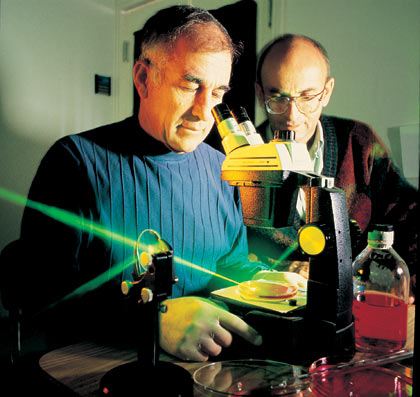As at universities all over the world, advancement in scientific knowledge is the chief objective of researchers at Israel's universities. Books and journal articles by Israelis, encompassing all scientific fields, are a primary expression of the university sector’s output. Israel publishes a disproportionate percentage (about 1 percent) of the world's scientific publications, and in many fields, such as chemistry and computer sciences, they have a particularly high impact on the world scientific community.
Relative to the size of its labor force, Israel has a significantly larger number of publishing authors in the natural sciences, engineering, agriculture, and medicine than other countries, and an exceptionally high share of the country's publications are co-authored by Israeli scientists and those of other countries.
To integrate Israeli science into the international scientific community, post-doctoral research positions and sabbaticals abroad as well as attendance at foreign scientific conferences are encouraged, and a wide range of exchange programs and joint projects are maintained at institute, university, and government levels with counterpart organizations overseas. Israel is also an important center for international scientific conferences, hosting many such gatherings annually.

Photo courtesy of the Weizmann Institute of Science
Concomitant with their scientific research activities, the universities continue to play an important and innovative role in Israel’s technological advancement. The Weizmann Institute of Science was among the first in the world to set up an organization for the commercial utilization of its research (1958); today, similar organizations exist at all Israeli universities. The establishment of sciencebased industrial parks adjacent to university campuses has been pioneered with great commercial success. Universities have also set up spin-off industrial firms for the commercialization of specific products based on their research, often in partnership with local and foreign concerns.
Interdisciplinary research and testing institutes are functioning at universities in diverse scientific and technological fields vital to the country's industry, serving areas such as construction, transportation, and education as national focal points for applied R&D. In addition, a high proportion of faculty serve industry in an advisory capacity on technical, administrative, financial, and managerial matters.
Educating Israel's Einsteins
Any good innovator knows that it is rare for a first attempt to be the best attempt. In the case of the Technion Israel Institute of Technology, the first institution of higher education established in Israel, this happens to be the case. Founded in 1924 as the ‘Technikum,’ the institution was established to give new Jewish immigrants the chance to acquire the technical studies they were prevented from pursuing in Europe. Men and women from diverse backgrounds came together on the Technion’s Haifa Campus to pursue degrees in engineering, science, medicine and technical studies. Over time, the Technion has become the leading scientific and engineering school in the Middle East, educating Nobel Prize winners, world-renowned entrepreneurs and top scientists.
|